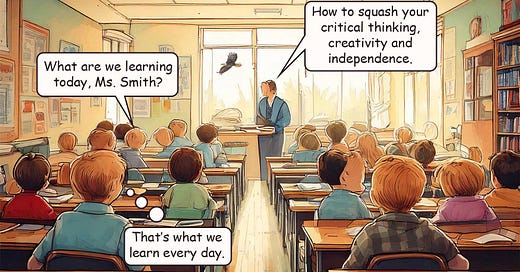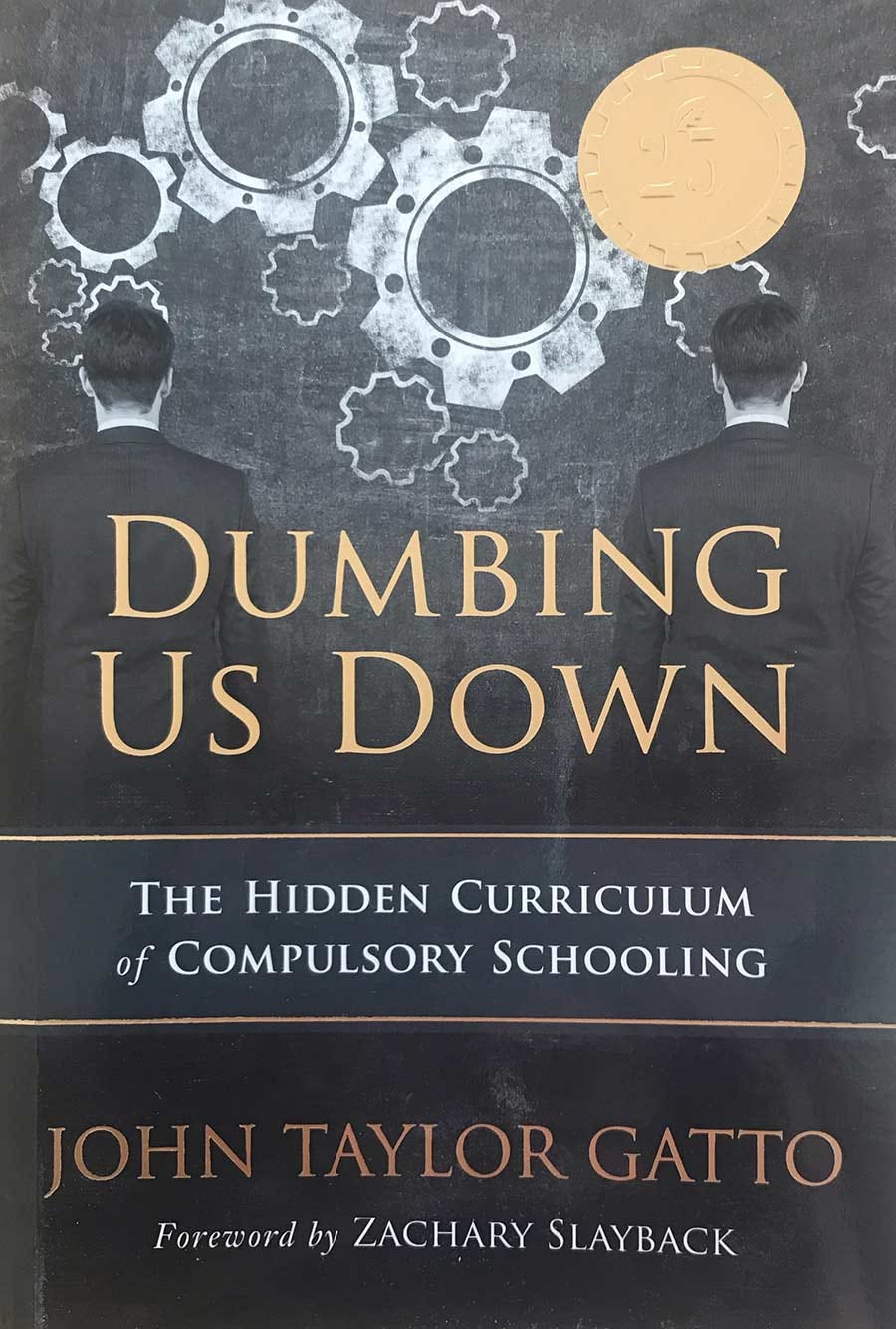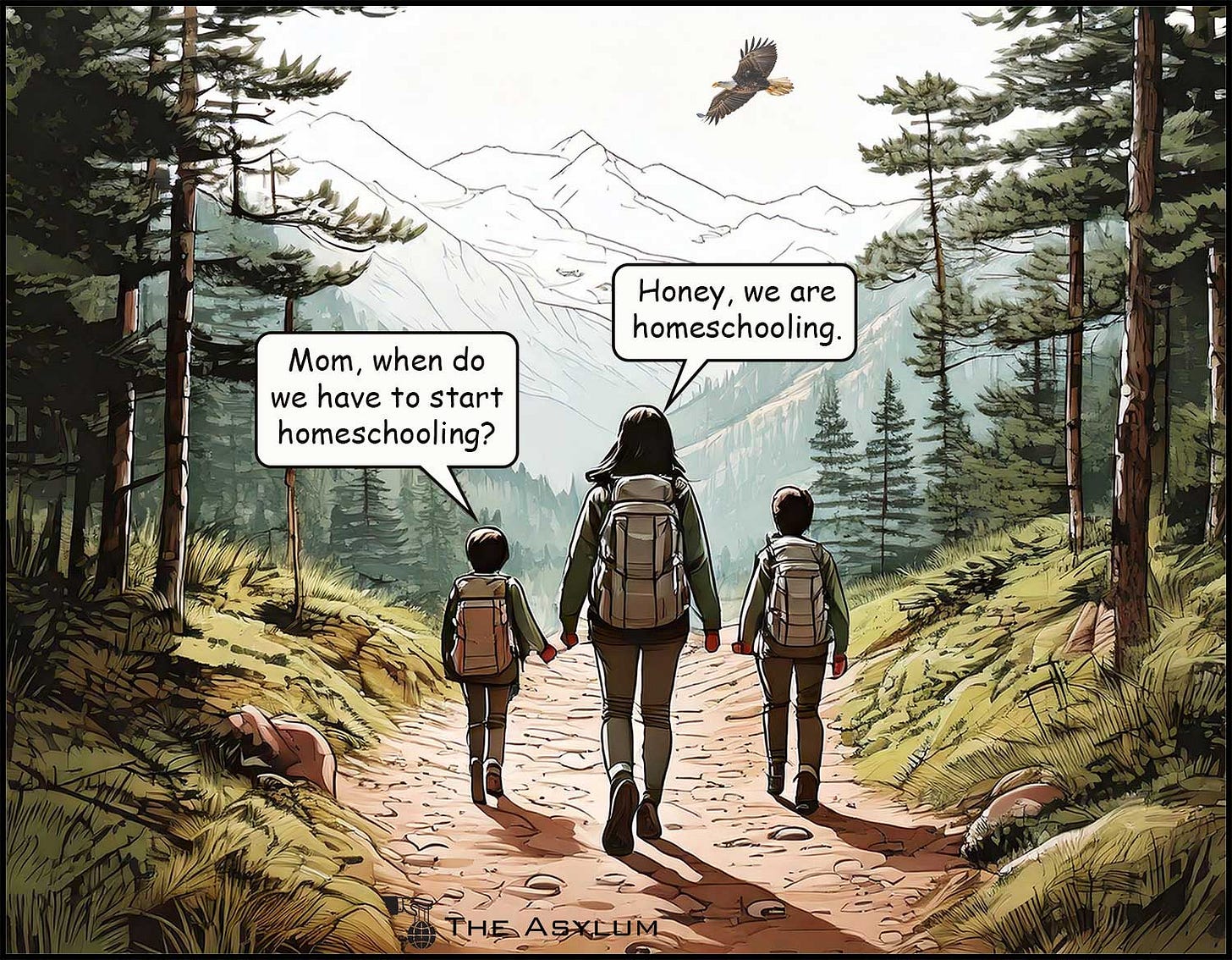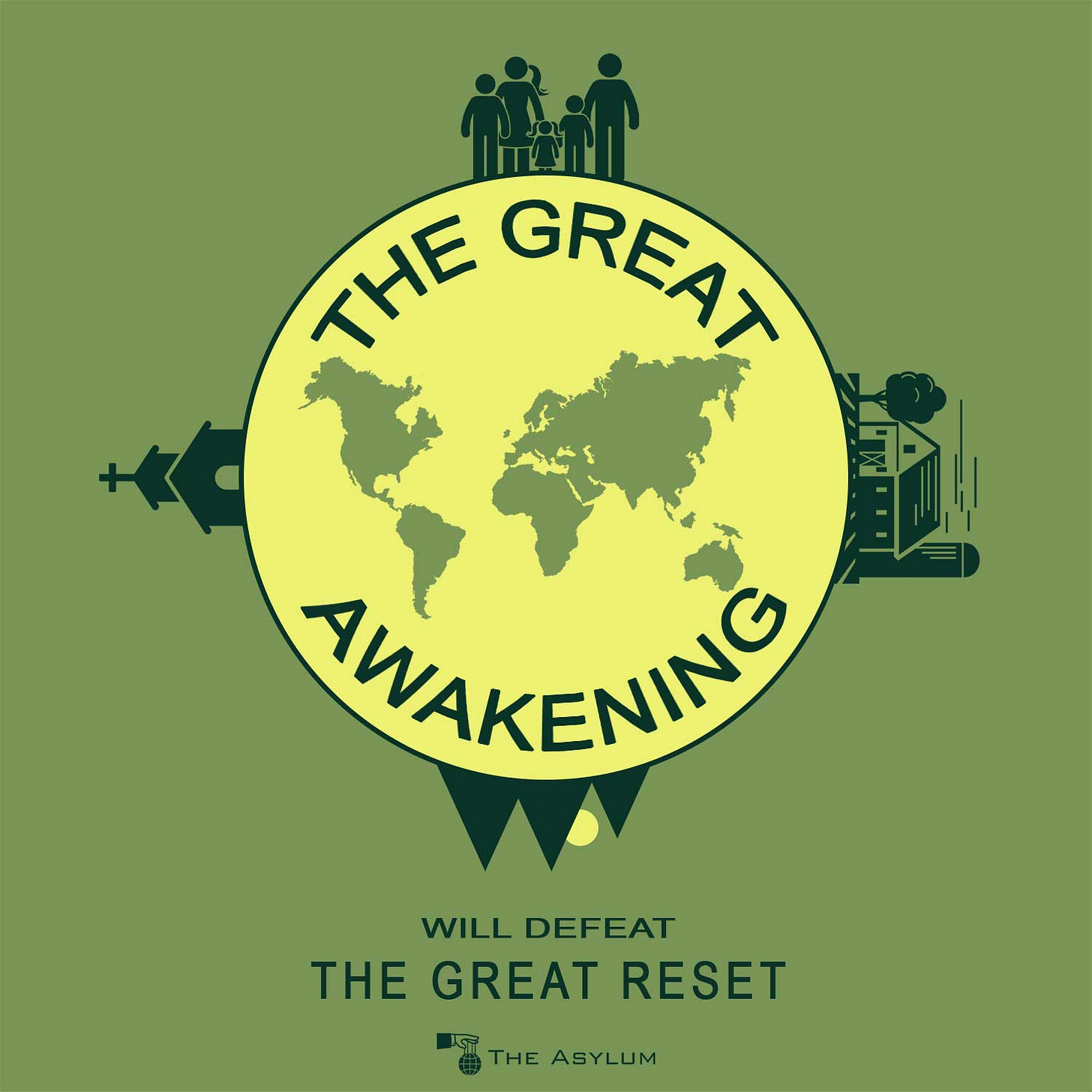We don't need school reform. Schools are working exactly as their designers intended. We need more choices and options outside of school.1
— Zachary Slabach, Dumbing Us Down Foreword
Dumbing us Down: The Hidden Curriculum of Compulsory Schooling by John Taylor Gatto is an excellent, excellent book. I wouldn’t blame you if you just stopped reading this, buy the book and start reading it. It’s not a long book and it is packed full of important thoughts and evaluations of the public school system.
Gatto knows what he’s writing about. He taught in the New York City public school system for 30 years and won New York State Teacher of the Year for 1991. He has nothing good to say about public education. This book of essays was published in 1992, so you can imagine, if you dare, what he would think of today’s public schools.
But it’s not just the content that is being taught and not learned, it is that the system itself is set up so that students will not learn critical thinking skills. Many people against homeschooling after reading Dumbing Us Down decided to homeschool their children.
I’m going to digress a bit and take you through my education, not because it’s unique, but because I think it’s typical and I assume many, if not most of you, will be able to relate. It’s the type of dumbed down education Gatto is writing about.
If you had to choose one word to describe your education through high school and even through college (assuming you were not homeschooled) what would it be? I have no trouble deciding:
Boredom.
I was constantly bored. In grammar school I always watched the clock: 10:15, recess; 12:00, lunch; 3:00, freedom. Day after day, week after week, month after month. And then there was summer vacation: free at least, free at last, thank God almighty, free at last!
In high school, with some exceptions, it was the same, except, unfortunately, there were no recesses, just lunch. There were however bells. Lots of bells. In college, same thing, watching the clock. Did I learn some valuable things? Sure, some. Was it enough to justify the amount of school I endured? No, not even close.
I completed a Masters program in education to get a pay raise for my teaching job. It too, was boring, except when one professor we had digressed into personal stories. Playing an arcade video game (Zaxxon) with my fellow teacher during breaks, however, was not boring.
Surviving that much boredom must do something to your mind, something to your attitude, something to your intellect. It can’t be good. Sitting at a desk six to seven hours a day, filling out worksheets, reading textbooks and taking quizzes, what does it ultimately accomplish? Not much good, Gatto would say, and a lot of bad.
The “schooling”2 as Gatto calls it (he doesn’t call it education), prepared me, prepared us, to “obey orders.”3 Upon college graduation I looked for a job because that’s what you did. It never occurred to me that I could do something on my own. That was never even presented as option and why would it be? Our consumptive culture needs worker drones for corporations, the government and school systems.
In my mid-twenties, after I realized how deficient my high school and college education had been, I started educating myself by reading classics, science fiction, poetry, philosophy and history. Literally, I was angry that I had not been exposed to much great literature, embarrassed when I asked a bookstore clerk where I could find Nietzsche’s books, but I pronounced Nietzsche as Nitschke, the name of the Green Bay Packers linebacker (1958-1972). I was single at the time and the young, attractive woman corrected me. I didn’t ask her out.
But the point here is not that everyone should know how to pronounce Nietzsche or that everyone should read him. The point is in school we learn what we don’t need to and don’t learn the things that we not only need to, but more importantly want to. Does anyone really think the “joy of learning” is taking place in public schools six to eight hours a day?
I had two school experiences that I loved. The first one was after I got accepted into a graduate program in literature and creative writing in my early 30s. I loved those classes…because the subjects interested me immensely.
In my late forties, after getting laid off from my delivery job, I enrolled in a year program for web development at a local community college. I loved those classes too, again, because it was something I was interested in, that I wanted to learn. Upon completing those classes, what did I do? I looked for a job, but fortunately no web companies wanted to hire someone with no experience and pushing 50. So I was more or less forced into starting my own business.
Starting and running my web development business is one of the best and most rewarding things I have ever done, but my public and private schooling did not prepare me for that. It prepared me to slip into the pyramid where I belonged. Sailing down the Nile was not an option.
The basic premise of Dumbing Us Down and the next two books after this that I’ll be reviewing (The Book of Learning and Forgetting and Weapons of Mass Instruction), is that public education is not only not necessary, but it is harmful. It doesn’t create critical thinkers, it destroys them. It doesn’t help children become independent, it helps them become dependent. It makes them into consumers, good consumers who fill the coffers of corporations that desperately need people to buy things, often things they don’t need.
Gatto didn’t think the schools could be fixed even back in 1992 when this book was first published. If they are going to to be fixed it will have to happen from the bottom up. The people with the power to fix schools, if they truly did what was necessary, would eliminate their own jobs and that will not happen. Bureaucrats do everything in their power to guarantee job security, not ruin it.
If we can fix it, fine; if we cannot, then the success of homeschooling shows a different road that has great promise.4
Brian, a teacher friend of mine who just retired after over 30 years, in a rather heated debate in a text thread with a few friends of ours had this to say:
Public education has made an art form of wasting taxpayer dollars. It’s a bureaucratic system that keeps good teachers from flourishing and allows incompetent ones to prosper. And now the woke agenda is taking hold in schools all across the country. There is zero chance I would ever allow a child of mine to be educated in the public schools today. ZERO!
If you’re thinking, well, my kids go to a good private school, Gatto would even take issue with that. Part of his argument is that the structure of public schools, the structure that most private schools also follow, is set up to hinder learning: jumping from one subject to another, little or no downtime for reflection, bells, rules, mindless repetition, boring textbooks and worksheets—how did we survive?
Gatto’s answer is, we didn’t. We came out of the system worse off. He provides lots of examples of people who did not go to school but who became very successful. They didn’t need public schooling, neither did we and neither do our children.
Public schooling is a relatively new endeavor and one that met with much resistance, something I’ll get into in upcoming book reviews, but it’s purpose was not education. Gatto writes:
…the great H.L. Mencken, who wrote in the American Mercury for April 1924 that the aim of education is not
“…to fill the young of the species with knowledge and awaken their intelligence…Nothing could be further from the truth. The aim…is simply to reduce as many individuals as possible to the same level, to breed and train a standardized citizenry, to put down dissent and originality. That is the aim in the United States…and that is its aim everywhere else.”5
There’s a lot of positive in this book too (I’ve focused on the negative, I realize). Children love to learn and it doesn’t have to be a struggle. People new to homeschooling tend to take their experience in public schooling and bring it home with textbooks, worksheets, tests and papers. Homeschooling can and should be both fun and rewarding for parent and child.
Gatto argues that when a child is ready they can learn what they need to in math and reading in 100 hours. What children need is guidance. Children can take far more in at an early age than their reading skills would allow. Reading to your kids is one of the best things you can do and it shouldn’t be only books like The Cat and The Hat.
Homeschooling is not new, it is old, it is the way people used to learn (Benjamin Franklin and Abraham Lincoln for two examples). It is public education that is new, that faced much opposition when first proposed.
If you are thinking at all about homeschooling and you’re just not sure if you really want to or if it would be good for your kids, get this book and read it. It may change your mind.
We suppress genius because we haven’t yet figured out how to manage a population of educated men and women. The solution, I think, is simple and glorious. Let them manage themselves.6
Notes
Gato, John Taylor, Dumbing Us Down: The Hidden Curriculum of Compulsory Schooling, New Society Publishers, Gabriola Island, Canada. 2017 (first edition 1992). p. xvi.
p. 20.
p. 20-21.
p. 27.
p. 97.
p. 105.









Look up "Prussian model/reforms". Realize that the foundation of our compulsory primary/middle school system was the need for a more effective military capability.
https://en.wikipedia.org/wiki/Prussian_education_system#:~:text=It%20expanded%20the%20existing%20schooling,required%20additional%20payment%20by%20parents.
Then look up the origins of the USDA school lunch program- Again, this was originally about MILITARY PREPAREDNESS- An unacceptable % of draftees had been found militarily useless due to childhood malnutrition related mental & physical disabilities.
https://www.nps.gov/articles/000/nutrition-on-the-home-front-in-world-war-ii.htm
Next, let's discuss the origins of the Interstate Defense Highway system?
----------
After 12 years of (mostly) organized boredom, graduating HS and a brief stab at a state university undergraduate degree, I've been teaching myself for 40 + years.
Aside from four atypically engaging and competent math and science teachers (and one each in English language and arts) in HS, my time in public schooling has been fairly useless to my actual life and work.
I think I've mentioned this before, but I'll say it again; I haaaaaaaaaaaated screwl. It was prison. 😬